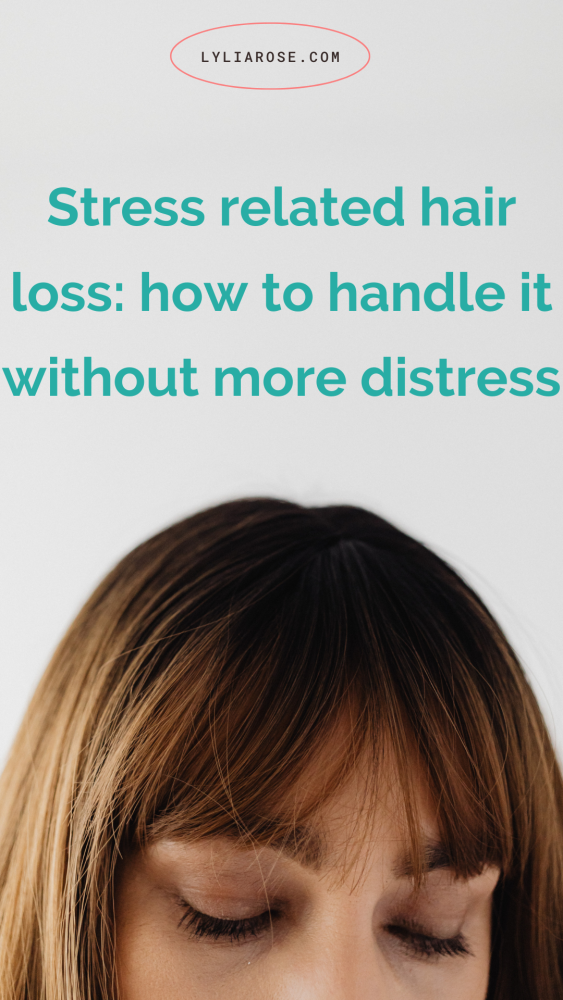Stress Related Hair Loss Recovery Tips
Posted on
Long-term, or chronic, stress can put you at risk of a number of health problems. It has been linked to depression, anxiety, insomnia, and digestive issues. However, one of the unexpected side effects of stress is hair loss. Although there is good news, if your hair loss is stress-related, it means that your hair follicles haven’t been permanently damaged, and as such, there are a few things that you can do, let’s dive in.
Here are several ways you can begin to reverse and treat your stress-related hair loss:
Stress related hair loss: how to handle it without more distress
Diet & nutrition
Eating a healthy diet is important for your health overall, but it can also have an impact on your hair growth. There are several vitamins that have been linked to hair growth.
Firstly, vitamin C encourages the production of collagen, which is found in hair follicles. Next, vitamin B promotes healthy skin and beautiful hair. Lastly, Vitamin E contains potent antioxidants which can improve the health of your scalp. If your diet is lacking in any of these vitamins, then it could be contributing to your hair loss.
Try to think about your diet more, and if you cannot find a way to incorporate more foods with these vitamins, you may want to consider supplements.
Hydration is also important, again, for your overall health and almost all of your bodily functions. Every cell in your body relies on water to function properly. Most people should aim to consume around two to two-and-a-half litres of water a day. Click here to learn why we choose distilled water!
Stress management
Managing your stress levels is essential in trying to reduce your hair loss; otherwise, you are merely addressing the symptoms without getting to the cause. There are several methods that you can use to reduce your stress, and you might have to try a couple of different methods until you find the one that works the best for you.
For example, exercise is a great stress reliever; you could sign up to a class, take up running or simply start going for walks. You could also consider occupying your time with a hobby; spending some time doing what you enjoy is a great way to combat stress.
Lastly, you could also try meditation or breathing exercises. They are a great way to ground yourself and refocus when you feel stressed.
Topical treatments
If you want to take more of a proactive approach, there are a few different creams and oils that you can try to help with your hair loss. Firstly, there is Minoxidil which is an over-the-counter medication. It is most commonly found as a foam, but it can be a cream or a spray too. You can apply it to your scalp, beard or even eyebrows. There are variations formulated for male or female use. Minoxidil is thought to prolong the growth phase of hair, and it can take up to four months until the results are noticeable.
You can also use cbd hair growth oils as the ECS found in compounds like CBD is known to regulate a wide range of biological systems, influencing aspects, such as mood, memory, and the body’s immune response.
Next, there are topical corticosteroids. They are sometimes used to treat alopecia areata. However, they often require a prescription, and they are usually used alongside other treatments, too, which calls into question their efficacy as a standalone treatment.
Finally, there is castor oil. It is a popular home remedy that is said to help hair growth. There is some anecdotal evidence that suggests that it may be effective, but the research is limited.
Medical intervention
The following treatments are often more effective, but they also tend to be more invasive, and they often require a medical professional to carry out.
Firstly, there is platelet-rich plasma or PRP. PRP is a relatively non-invasive procedure. It is designed to stimulate dormant cells, which have caused the hair to thin. First, a medical professional takes some blood from a donor site somewhere on the body. The blood is then put into a centrifuge which separates the plasma from the blood. The plasma is then taken and missed with a concoction of other proteins designed to stimulate hair growth. The mixture is then injected back into the scalp. Another option is seeking hair loss treatment in Singapore, where experienced specialists offer advanced medical interventions tailored to individual needs.
Next up, hair transplants. These are by far the most invasive, but if you have already lost a significant amount of hair, it might be your best option. Healthy hair follicles are harvested from areas on the scalp that still see a good amount of growth. These follicles are then transplanted into the scalp, where the hair is thinning. It helps to stimulate the growth of new hair.
Finally, the least invasive medical intervention is Finasteride. This drug is commonly used to treat hair loss in men. It is a tablet which if taken daily, can help by adjusting hormonal levels in the body. Unfortunately, you may not always be able to purchase Finasteride over the counter; you need a prescription. However, you can purchase finasteride 1mg tablets online from Chemist Click. You will need an online consultation from a medical professional. Once approved, your medication will be sent directly to you in discrete packaging.
In conclusion
Hair loss is a stressful experience. It can feel like you're losing your identity and becoming self-conscious. The good news is, you can take action now with these hair loss recovery tips.
Stress-related hair loss is often cyclical. The stress causes hair loss, and the hair loss then causes more stress. If this is something that you suffer with, you aren’t alone, and you do have some options, as shown in the list above or even choosing hair extensions to give your hair volume. Check out these tips to regenerate hair after wearing hair extensions.
Depending on your stress levels and the extent of the hair loss, you should be able to find a solution that works for you.
Is work-related stress causing your hair loss? Reduce stress with these work-life balance tips.




